Beauty can mask horror.
The 6th of April is a gorgeous Wednesday morning in the village of Palanca, the easternmost point of Moldova. Driving there from Chisinau, Moldova’s capital city, traffic is light, the land is kissed with golden light, and farms are old but well-kept. The only drawback is an endless string of broken pavement caused by swollen winter ice, now melted. It seems we bounce our way for the two and a half hour drive.
As we enter the township, a small tent city comes into sight. There is some activity but it is mostly empty.
People for whom it was built do not stay long.
A mere 35 miles from Odessa in Ukraine, Palanca’s border crossing with its neighbor at war is clean, comfortable, modern. It feels like a first-class rest stop in the US or Europe. A large but empty UN Refugee Agency van is in the parking area.
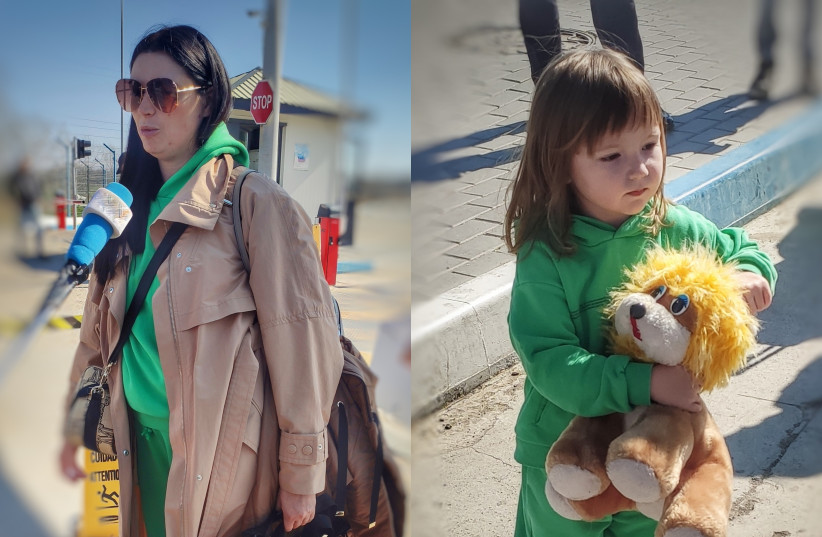
At first, there is no activity. Then they appear. Coming into focus as they slowly cross the no man’s land from Ukraine to Moldova, older women, then mothers laden with suitcases and children, walk toward us, toward safety – away from their homes in southwestern Ukraine that, only a few miles away, are being bombed by Russia from battleships lurking offshore atop the Black Sea; probably beneath it, too.
A little girl materializes, perhaps four or five years old, dressed in a spring green running suit. She trots ahead of her mama, soberly carrying a stuffed toy lion with large eyes and a golden mane. Her mother, Katerina, not far behind and dressed in identical garb, carries her daughter’s things in a bright orange suitcase. They are fleeing from their “beautiful house” in Odessa.
As another mom keeps an eye on her serious child, Katerina stops to speak with us, a group of journalists brought to Moldova by IFCJ, the International Fellowship of Christians and Jews.
What she has to say is unforgettable.
IFCJ, A.K.A. the Fellowship, underwrote and hosted eight journalists to witness its efforts, in partnership with Israel and other NGO nonprofits, to provide food, shelter, transportation, counseling and medical assistance to all refugees fleeing Ukraine – and some from Russia, too. It also facilitates the aliyah (immigration) process of those who qualify to become Israeli citizens.
Since the Russian invasion began on February 24, the Fellowship has given $6.5 million for support of refugees. It has also brought 20-plus planeloads of olim to their new home, Israel. Financial support has included food for Passover. In fact, just before it began, it distributed 10 tons of matzah to the Jewish community still in Odessa.
The Fellowship is unique among the family of NGOs assisting refugees. It is an Orthodox Jewish organization raising most of its funds from a modest average donation of $45 made by Christians.
“With the Fellowship,” says CEO Yael Eckstein, “it’s really important that we are Jews and Christians coming together with a bond based on what unites us, not what separates us. In coming together we discover, wow, we both stand for so many of the same values; there is so much more that ties us together than what separates us. By joining each other, we highlight our common biblical roots, our mutual support and love for Israel, including its fulfillment of biblical promises to bring the Jewish people back to their home in the land God promised to them.”
What about the ubiquitous concern that Christian supporters have an ulterior motive to proselytize?
Eckstein replies: “Bishop Paul Lanier, chairman of our board, expresses our donors’ sentiment when he always says: ‘The reason why I give to the Fellowship is because they are an organization run by observant Jews. As a Christian, as a pastor, it is important that my gifts to Israel are not tainted with any hint of ulterior motivations. I want to give to Jewish people to distribute funds because I want them to know that my only motivation is to help.’”
Jews also contribute, she says. “Donations from Jews have grown significantly in the past few years. Why? Because the Jewish community recognizes the important and strategic partnership with Christian supporters of Israel and they want to be a part of it. They also see how effective the Fellowship is in its distribution of funds.
“We make sure that every single penny goes to people who need it. Making everything work requires organization. Among nonprofits in general, the average amount of donations that covers administration costs is 35%. The Fellowship’s cost is close to half that amount. About 20% of donations are used for organization costs to make sure that every shekel or dollar actually reaches people in need.”
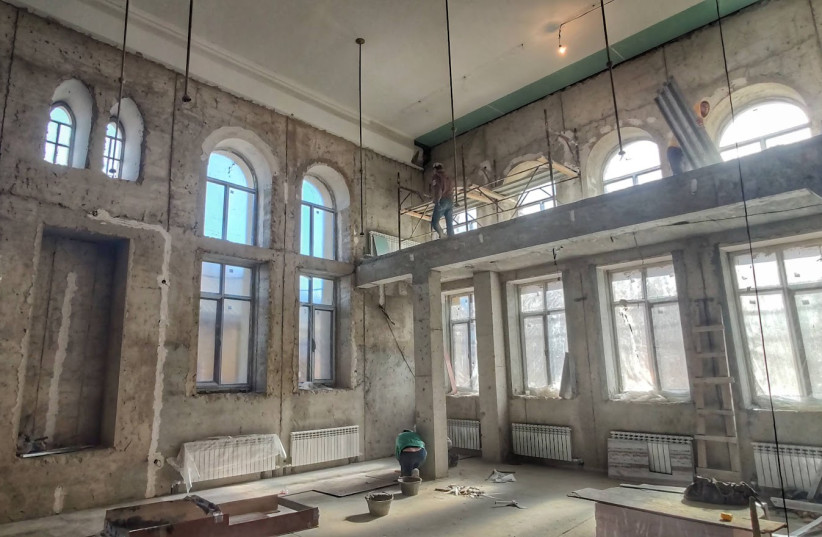
AT THE Moldova-Ukraine border and a mere 35 miles from her beautiful home in Odessa, Katerina stands at the journalist’s mic. Her English is remarkably good.
Asked about her situation and how she is feeling, her mouth tightens, her eyes fight tears.
“The Russians are bombing us from the sea,” she says, referring to the Black Sea. “We were in the line of fire.”
Her husband, required to stay in the country, has compelled her to leave, taking their daughter to safety. According to Ukrainian law, men from the ages of 18 to 60 must remain as potential draftees into armed resistance against Moscow’s military minions.
Having just left her husband and home, Katerina pauses.
“I am full of sadness, full of hate,” she says. “Never forgive, never forget.”
With her words, the beauty of the day is rent apart. With its jagged tear, a horror is unmasked that most cannot imagine.
Where will she go now? “Germany,” she answers.
Of the 4.7 million refugees who have fled Ukraine, roughly 400,000 are in Moldova. For most it is not a final destination. Many are waiting, hoping against hope to return to their homes. At the Palanca border crossing we are told that, already, some have trickled back. Others in Moldova are set upon farther destinations. Poland, Germany and France are popular.
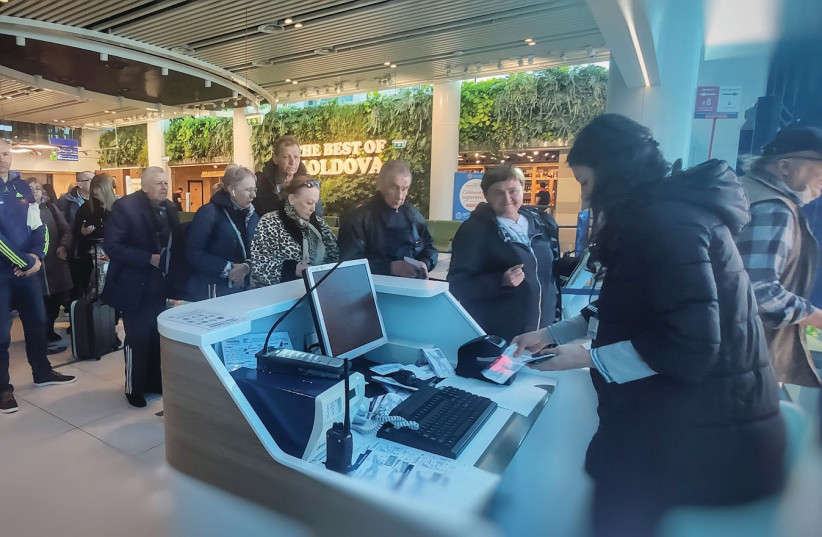
For some, however, the dream is Israel. Any refugee with one Jewish grandparent qualifies to make aliyah. According to most estimates, some 200,000 Ukrainians qualify. While that could result in a huge influx of immigrants to the Jewish state, it probably won’t, at least in the near-term.
According to the JDC (the American Jewish Joint Distribution Committee), some 40,000 Jews have left Ukraine so far. Many of them have left behind husbands, sons and fathers because of the draftee law. Not surprisingly, many if not most of them are waiting in countries contiguous to Ukraine, hoping to return. Others inside their besieged country – some 160,000 of them – have not yet left, many if not most because they have chosen to stay.
Nonetheless, Israel is bracing for a surge. At the time of this writing, the Immigration and Absorption Ministry reports that 13,391 immigrants have come to Israel from Ukraine and Belarus – and Russia. Most of these were invited to a Passover Seder meal either in Israeli homes or in hotels where some are temporarily housed.
When they cross into Moldova, refugees who express a desire to come to Israel are driven to a temporary facility in Chisinau with an abundance of beds set out on an open warehouse floor. There they have access to food, medical care, and counseling. Assistance is also provided to begin the process of qualifying for immigration to Israel.
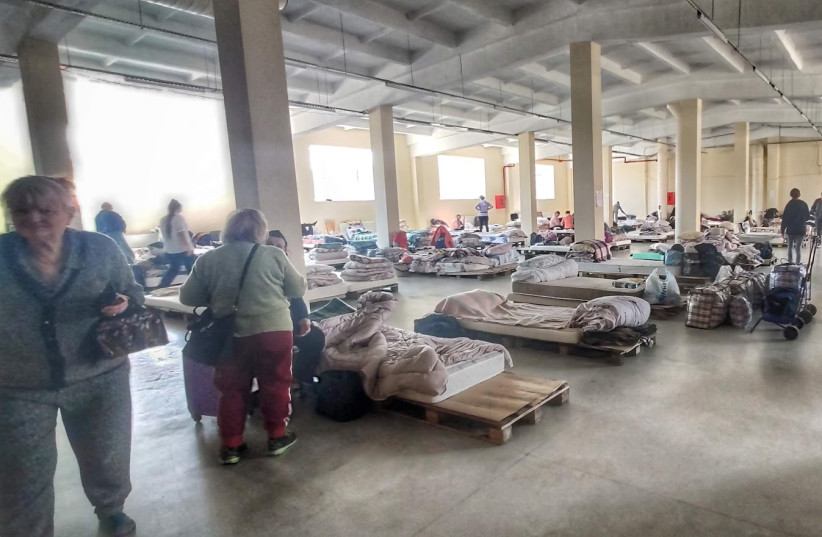
Refugees from Russia too?
IT IS THURSDAY morning, April 7. Our small group of journalists is joining refugees who are making aliyah, leaving one world behind and moving to another. Most are older people, couples and singles; some younger mothers alone with children.
My eye is drawn to a new friend, journalist Pascal Roy. Pascal does reporting for Radio Sefarad, underwritten by the Federation of Jewish Communities in Spain. Born in Belgium, Pascal’s mother tongue is French. He also speaks English, Italian, German, Dutch and Hebrew. Notably, Radio Sefarad’s audience is not only in Spain, but includes most of South America.
Radio gear in place, he is interviewing a vivacious young mother holding her two-year-old son. Unlike others her age, her husband is with her. Speaking to each other in English, I shoot a few photos and do my best to listen. Later, Pascal shares his audio interviews with me.
The woman with whom he is speaking is Anna Babenko. Her squirming son is Kai. Alexey, her husband, stands to one side. They are not escaping Ukraine, they are escaping Russia.
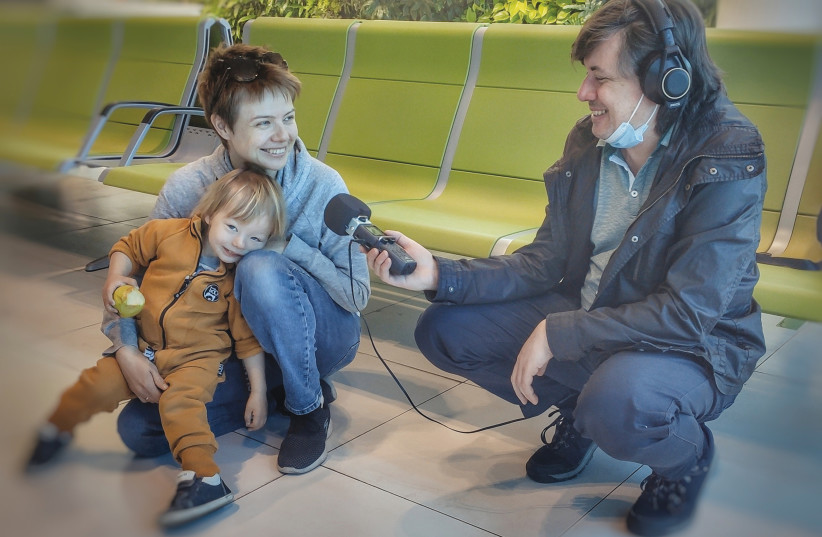
“We were on a vacation to Bulgaria,” she says, exuberant in all her remarks. “Our flight left on February 23, one day before Russia invaded Ukraine. We did not know it at the time, but it was the last flight from Moscow.
“The next day we woke up and found there was a war. Five minutes after hearing the news, we realized we no longer have a home. There was no way to return to Russia. Because I was supporting Ukraine in Moscow and opposed the prospect of war – all on social media – I knew that, if we returned, I almost certainly would be arrested.
“So, we started looking for a new home. After the war started and while we were in Bulgaria, people there were ‘a bit rude’ with us. It was not a friendly environment,” she said.
“Because I was born in Moldova, it was a natural place for us to look instead of Bulgaria. My husband has a Jewish father, so another option we began to explore was Israel. It did not seem likely we would be able to go there.
“But we were! People at the Israel embassy in Chisinau were so kind, it was amazing. They helped us, our documents were good. That is why we are here today. Israel saved us!” she exulted.
“Our new home will be in a city called Akko [Acre]. We hope it will be comfortable for us. We do not know anyone in Israel but are excited about moving there. I am also excited about learning Hebrew. It is very important to respect the country where you live by learning its language. I already know Moldovan, Turkish, English and Russian – Hebrew will be one more! My goal is to learn it in six months,” Anna said.
“And my son will also learn Hebrew. Arabic too. I think it is a wonderful opportunity for him to get to know the world and explore the cultures here,” she said.
“Moving will be easy, I think. Over the last month we have lived in five places and I have learned I can pack all my things into luggage in 20 minutes. It also helps that we don’t have a lot of money. That has made it much easier to make the break from our home in Russia. People with money there have a hard time making a move like this. It is difficult for them to get money out of Russia to another country.
“I work in marketing. I have heard that Israel is a good place for IT. I hope I will find work there.”
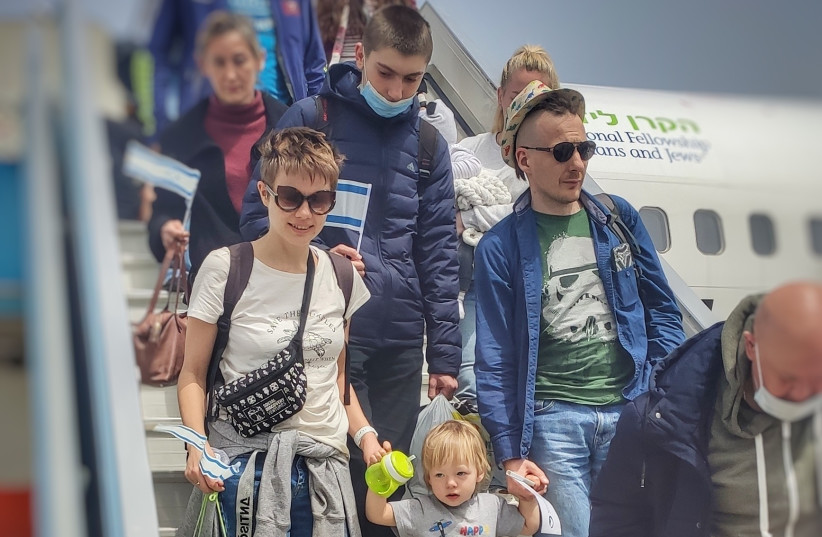
TWO DAYS after arriving in Israel, Anna is asked, “How are you feeling?”
Still exuberant, she replies, “My feelings are like a roller coaster. I look out the window and feel happy. Two minutes later I am sad,” she laments.
“After that, I feel hope. I am alive!”
Marveling at Anna’s attitude, I realize an important refugee lesson, something all Jews learned when they left Egypt more than 2,300 years ago.
Beauty can mask horror – but hope, like the parting of the Red Sea, defeats horror, overcoming unspeakable evil and loss...
... with life. ■
The writer is an American journalist living in Israel.
Special thanks to journalists and IFCJ personnel on the trip who facilitated this report, including Gidi Schmerling and Gadi Teichman Dan of IFCJ; Pascal Roy reporting for Radio Sefarad; Tania Krämer of DW News; Daniel Cohen reporting for Newsmax; Oren Rosenfeld, CEO of Holy Land Productions; Myung Hyung Ju of King’s Room Media; and Daniel Lidwin with The Kairos Company.
